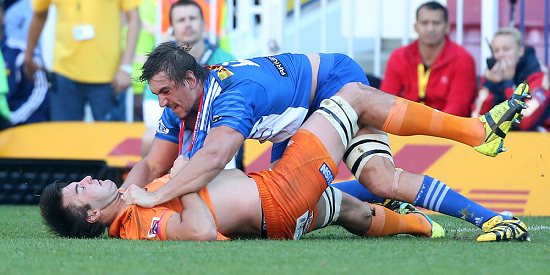 Rugby is a rough and tumble game, which is why the ref keeps a red card in his pocket. But maybe the time has come to add a new colour to the palate, to keep the action flowing and draw a line between thuggish play and unintentional behaviour
Rugby is a rough and tumble game, which is why the ref keeps a red card in his pocket. But maybe the time has come to add a new colour to the palate, to keep the action flowing and draw a line between thuggish play and unintentional behaviour
The result of the 2017 Super Rugby final is likely to be remembered more for the red card issued to Kwagga Smith than the fact that the Crusaders become the first team in the tournament’s history to cross the Indian Ocean and win. Well, certainly by Lions fans.
This while Lions hooker Robbie Coetzee went unpunished after receiving a red card for a so called “kick” to the head of Sharks flank Jacques Vermeulen. His actions were deemed “entirely accidental”, with no intention of kicking his opponent in his post-match hearing.
Both acts were stupid, but neither player went out to intentionally harm another player. In an era that sees us punishing the outcome rather than the intent, with a view to protecting the players’ wellbeing, have we not taken things a bit too far?
Should red cards not be kept for the thugs who go out to intentionally maim another player via a punch, head-butt, or eye-gauge?
In a fantastic debate on All Out Rugby, Ami Kapilevich and Zelím Nel discuss whether red cards are an effective measure to enforce the laws, or are robbing spectators of the even contest they’ve paid to watch. Ami reckons red cards are real life, get over it.
“When heinous acts occur on the field, they must sometimes result in a 14-man team. We need to be able to send players off because violent or repeated, and blatant, cynical play needs to be dealt with there and then, on the spot,” says Ami.
We shouldn’t be naïve about the lengths a player will go to prevent what could be a sure try, especially in a final, when the threat of suspension afterwards is meaningless, and the stakes are so high, he adds.
I agree. Rugby is the ultimate team sport, a reason I love the game so much, and want my son to play. But as the benefits are from the collective, should not the punishment also be collective?
A bit like in a sales team, where individual commissions only kick in if the greater team meet their overall objective. On the face of it, it might seem unfair to punish the whole team because one person failed to make budget, but might that person have failed because of a lack of team cooperation?
Instead of introducing his Western Cape clients to the new rep based in that area, and then chasing new clients in Joburg, where he is now based, Sarel instead chose to keep those relationships, meaning both areas were under served. How best do you get them to collaborate?
But Zelím reckons we should make transgressors on the rugby field pay, not the paying spectators, and this got me thinking.
Nel agrees that were punishment reserved for only after the match, it would incentivise spoiling tactics in big matches. Instead he would like to see the red carded player ejected from the game, but replaced after ten minutes with someone off the bench, with that team then also losing a further three seats on their bench.
“In effect,” says Nel, “The offending team go from having eight replacements to four. The contest remains 15 v 15, but the offending team lose part of their advantage because the opposition now have four more pairs of fresh legs on the bench.
It’s clever as it combines keeping the contest with punishing the team as a collective.
In 142 Super Rugby matches this season, 143 yellows and 14 red cards were issued, making the 15-versus-15, 80-minute contest an exception rather than the rule. So it’s worth pondering.
How about keeping the red card for eye-gauging, ear-biting thugs, and introducing an orange card for non-intentional acts that impact on player welfare. That would mean any time a referee has to say something like “I am left with no alternative according to the laws”, as both refs did in the above mentioned examples?
And with an orange card, comes the punishment suggested by Zelim?

Leave a Reply